Management Accounting Report: Budgeting, Styles, and Performance
VerifiedAdded on 2023/01/09
|7
|1980
|66
Report
AI Summary
This report delves into the realm of management accounting, emphasizing the pivotal role of budgeting in organizational decision-making, particularly within a dynamic business landscape. It explores the core functions of management accounting, which include the utilization of statistical data by managers to enhance decision-making, improve organizational control, and drive development. The report highlights the significance of budgeting as a tool for managers to make optimal decisions in fluctuating environments, covering budgeting processes and various types of budgeting styles like static, flexible, and participatory budgeting, along with their implications on business performance. The report also examines the merits and demerits of participatory budgeting, including information transfer, employee motivation, time consumption, and budgetary slack, providing a comprehensive analysis of how these factors influence a company's success, profitability, and sustainability. The report concludes with a summary of the importance of management accounting in making effective decisions.
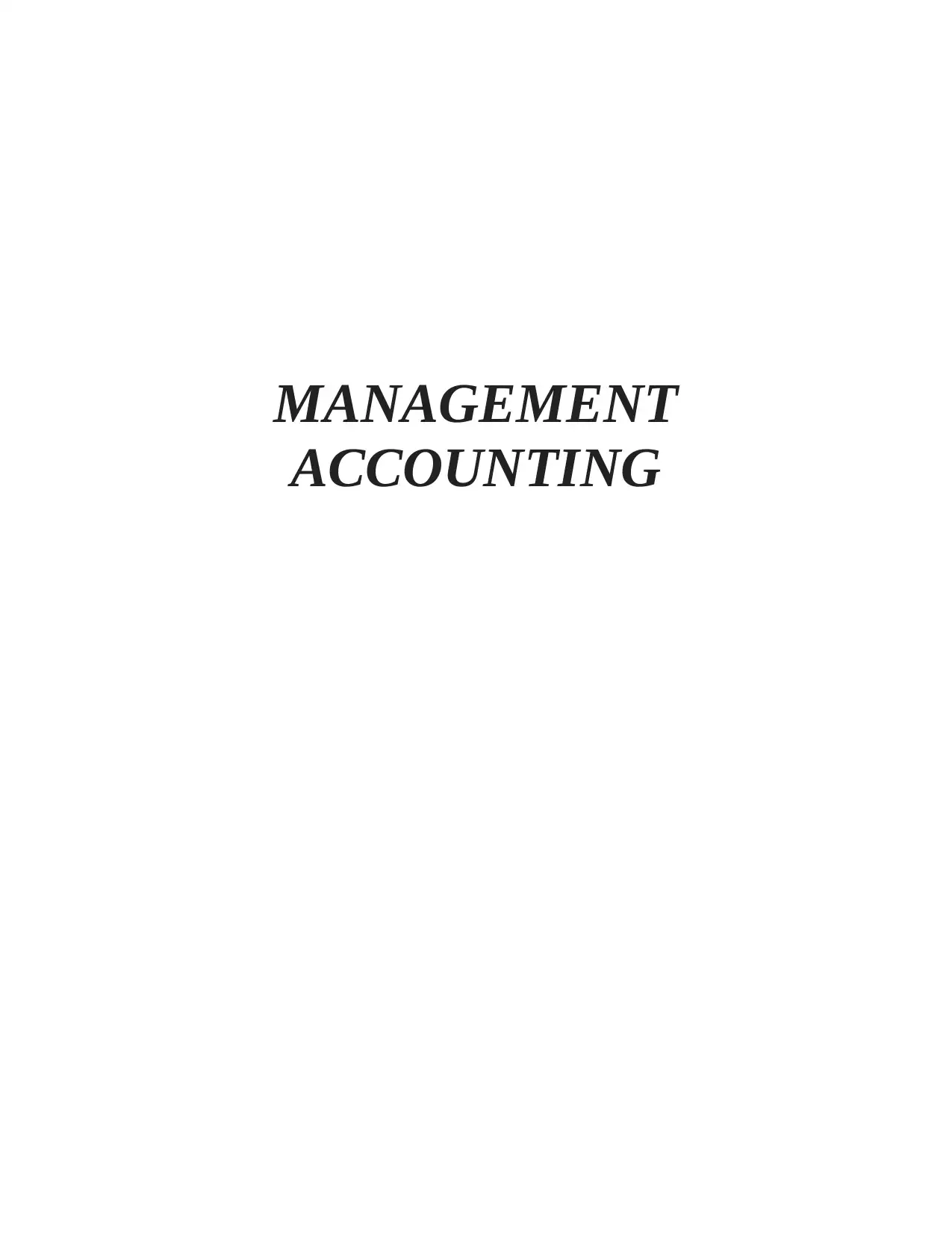
MANAGEMENT
ACCOUNTING
ACCOUNTING
Paraphrase This Document
Need a fresh take? Get an instant paraphrase of this document with our AI Paraphraser
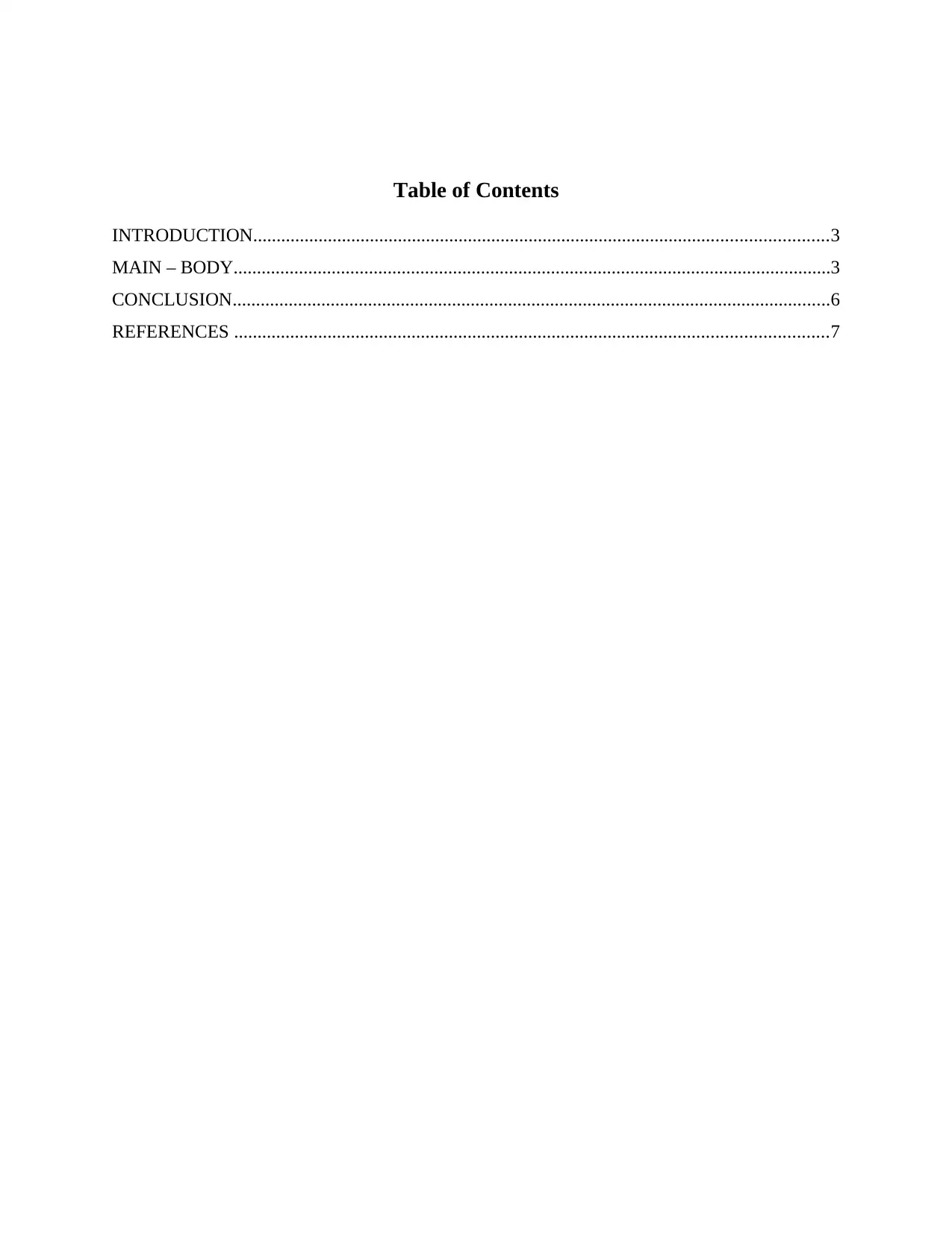
Table of Contents
INTRODUCTION...........................................................................................................................3
MAIN – BODY................................................................................................................................3
CONCLUSION................................................................................................................................6
REFERENCES ...............................................................................................................................7
INTRODUCTION...........................................................................................................................3
MAIN – BODY................................................................................................................................3
CONCLUSION................................................................................................................................6
REFERENCES ...............................................................................................................................7
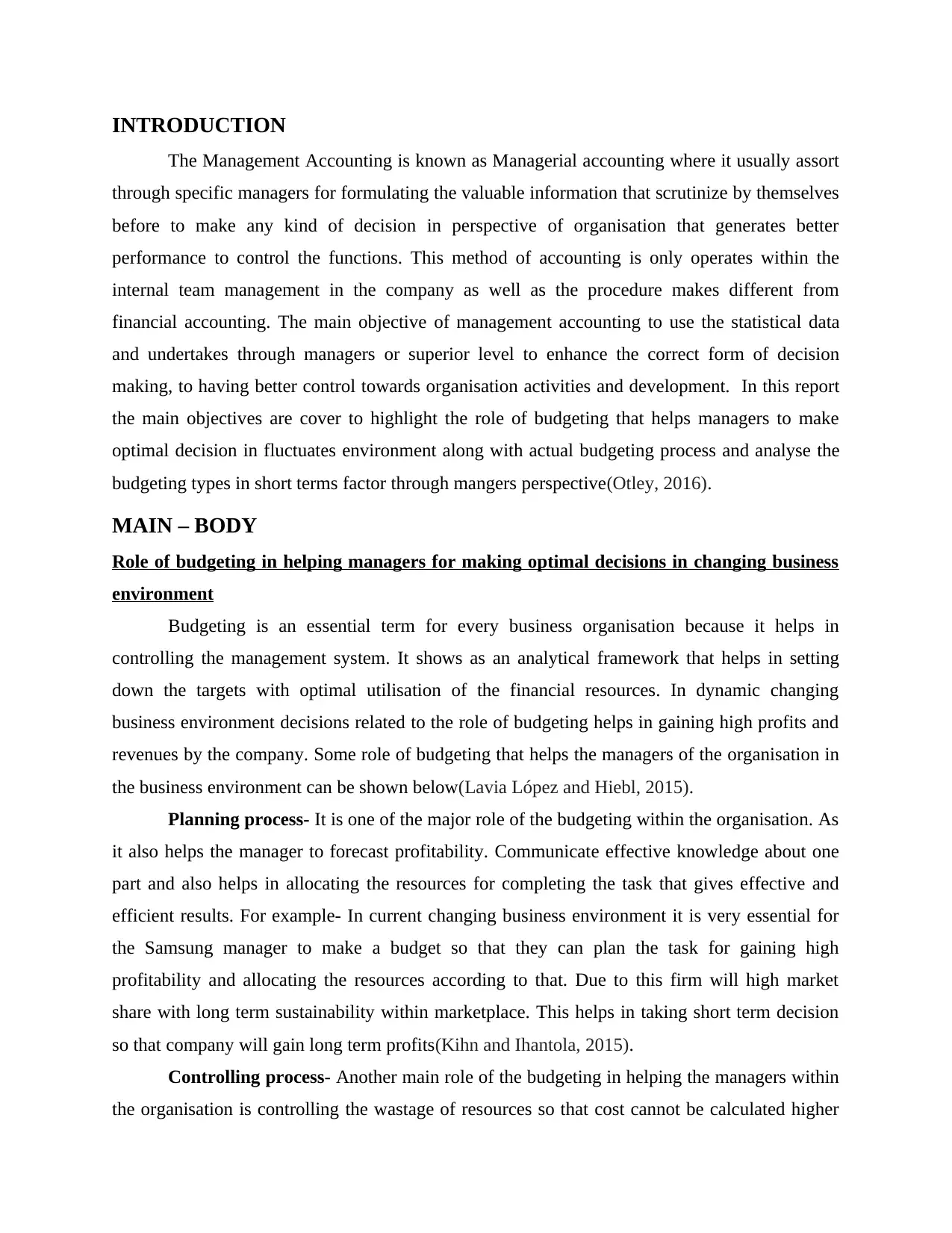
INTRODUCTION
The Management Accounting is known as Managerial accounting where it usually assort
through specific managers for formulating the valuable information that scrutinize by themselves
before to make any kind of decision in perspective of organisation that generates better
performance to control the functions. This method of accounting is only operates within the
internal team management in the company as well as the procedure makes different from
financial accounting. The main objective of management accounting to use the statistical data
and undertakes through managers or superior level to enhance the correct form of decision
making, to having better control towards organisation activities and development. In this report
the main objectives are cover to highlight the role of budgeting that helps managers to make
optimal decision in fluctuates environment along with actual budgeting process and analyse the
budgeting types in short terms factor through mangers perspective(Otley, 2016).
MAIN – BODY
Role of budgeting in helping managers for making optimal decisions in changing business
environment
Budgeting is an essential term for every business organisation because it helps in
controlling the management system. It shows as an analytical framework that helps in setting
down the targets with optimal utilisation of the financial resources. In dynamic changing
business environment decisions related to the role of budgeting helps in gaining high profits and
revenues by the company. Some role of budgeting that helps the managers of the organisation in
the business environment can be shown below(Lavia López and Hiebl, 2015).
Planning process- It is one of the major role of the budgeting within the organisation. As
it also helps the manager to forecast profitability. Communicate effective knowledge about one
part and also helps in allocating the resources for completing the task that gives effective and
efficient results. For example- In current changing business environment it is very essential for
the Samsung manager to make a budget so that they can plan the task for gaining high
profitability and allocating the resources according to that. Due to this firm will high market
share with long term sustainability within marketplace. This helps in taking short term decision
so that company will gain long term profits(Kihn and Ihantola, 2015).
Controlling process- Another main role of the budgeting in helping the managers within
the organisation is controlling the wastage of resources so that cost cannot be calculated higher
The Management Accounting is known as Managerial accounting where it usually assort
through specific managers for formulating the valuable information that scrutinize by themselves
before to make any kind of decision in perspective of organisation that generates better
performance to control the functions. This method of accounting is only operates within the
internal team management in the company as well as the procedure makes different from
financial accounting. The main objective of management accounting to use the statistical data
and undertakes through managers or superior level to enhance the correct form of decision
making, to having better control towards organisation activities and development. In this report
the main objectives are cover to highlight the role of budgeting that helps managers to make
optimal decision in fluctuates environment along with actual budgeting process and analyse the
budgeting types in short terms factor through mangers perspective(Otley, 2016).
MAIN – BODY
Role of budgeting in helping managers for making optimal decisions in changing business
environment
Budgeting is an essential term for every business organisation because it helps in
controlling the management system. It shows as an analytical framework that helps in setting
down the targets with optimal utilisation of the financial resources. In dynamic changing
business environment decisions related to the role of budgeting helps in gaining high profits and
revenues by the company. Some role of budgeting that helps the managers of the organisation in
the business environment can be shown below(Lavia López and Hiebl, 2015).
Planning process- It is one of the major role of the budgeting within the organisation. As
it also helps the manager to forecast profitability. Communicate effective knowledge about one
part and also helps in allocating the resources for completing the task that gives effective and
efficient results. For example- In current changing business environment it is very essential for
the Samsung manager to make a budget so that they can plan the task for gaining high
profitability and allocating the resources according to that. Due to this firm will high market
share with long term sustainability within marketplace. This helps in taking short term decision
so that company will gain long term profits(Kihn and Ihantola, 2015).
Controlling process- Another main role of the budgeting in helping the managers within
the organisation is controlling the wastage of resources so that cost cannot be calculated higher
⊘ This is a preview!⊘
Do you want full access?
Subscribe today to unlock all pages.

Trusted by 1+ million students worldwide
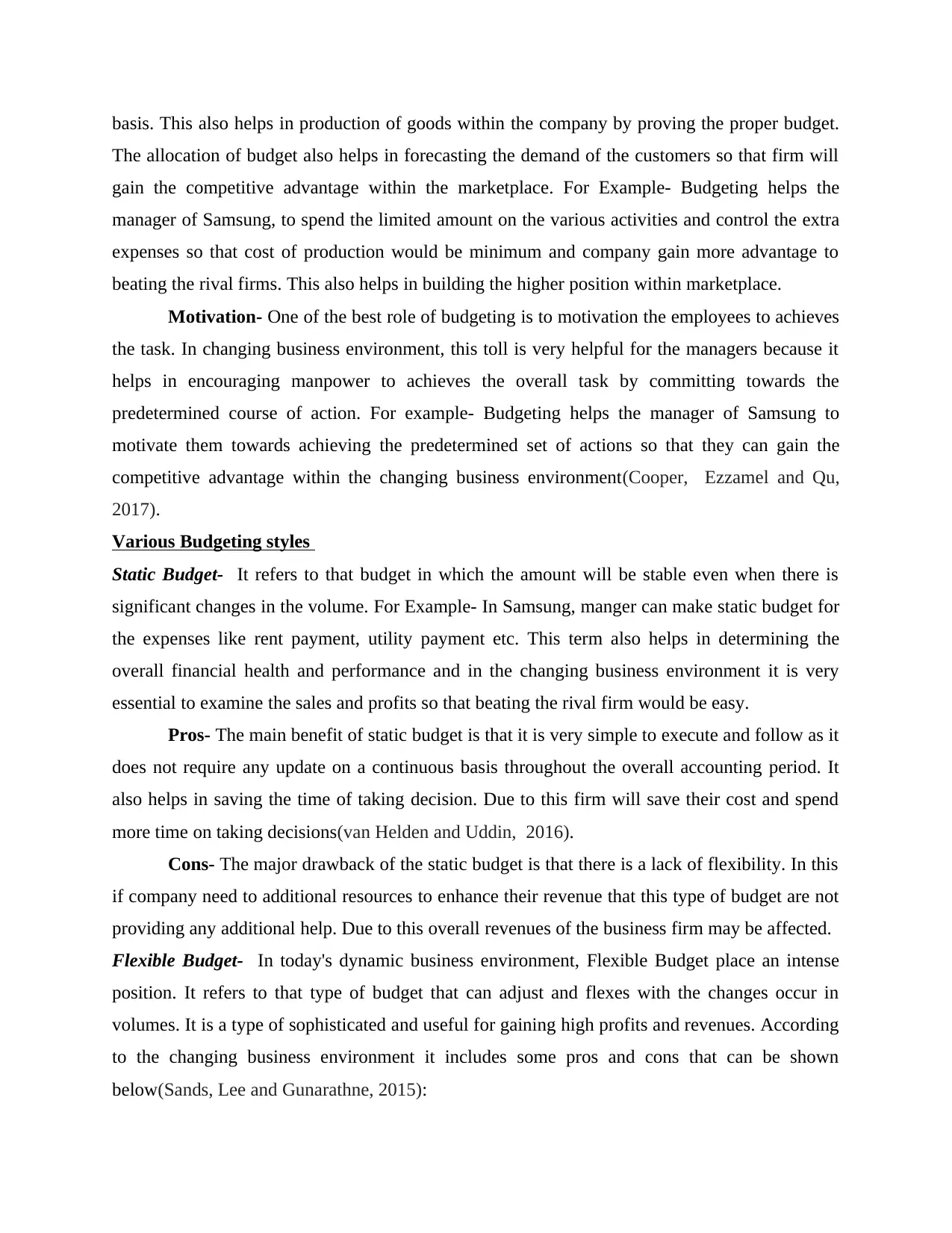
basis. This also helps in production of goods within the company by proving the proper budget.
The allocation of budget also helps in forecasting the demand of the customers so that firm will
gain the competitive advantage within the marketplace. For Example- Budgeting helps the
manager of Samsung, to spend the limited amount on the various activities and control the extra
expenses so that cost of production would be minimum and company gain more advantage to
beating the rival firms. This also helps in building the higher position within marketplace.
Motivation- One of the best role of budgeting is to motivation the employees to achieves
the task. In changing business environment, this toll is very helpful for the managers because it
helps in encouraging manpower to achieves the overall task by committing towards the
predetermined course of action. For example- Budgeting helps the manager of Samsung to
motivate them towards achieving the predetermined set of actions so that they can gain the
competitive advantage within the changing business environment(Cooper, Ezzamel and Qu,
2017).
Various Budgeting styles
Static Budget- It refers to that budget in which the amount will be stable even when there is
significant changes in the volume. For Example- In Samsung, manger can make static budget for
the expenses like rent payment, utility payment etc. This term also helps in determining the
overall financial health and performance and in the changing business environment it is very
essential to examine the sales and profits so that beating the rival firm would be easy.
Pros- The main benefit of static budget is that it is very simple to execute and follow as it
does not require any update on a continuous basis throughout the overall accounting period. It
also helps in saving the time of taking decision. Due to this firm will save their cost and spend
more time on taking decisions(van Helden and Uddin, 2016).
Cons- The major drawback of the static budget is that there is a lack of flexibility. In this
if company need to additional resources to enhance their revenue that this type of budget are not
providing any additional help. Due to this overall revenues of the business firm may be affected.
Flexible Budget- In today's dynamic business environment, Flexible Budget place an intense
position. It refers to that type of budget that can adjust and flexes with the changes occur in
volumes. It is a type of sophisticated and useful for gaining high profits and revenues. According
to the changing business environment it includes some pros and cons that can be shown
below(Sands, Lee and Gunarathne, 2015):
The allocation of budget also helps in forecasting the demand of the customers so that firm will
gain the competitive advantage within the marketplace. For Example- Budgeting helps the
manager of Samsung, to spend the limited amount on the various activities and control the extra
expenses so that cost of production would be minimum and company gain more advantage to
beating the rival firms. This also helps in building the higher position within marketplace.
Motivation- One of the best role of budgeting is to motivation the employees to achieves
the task. In changing business environment, this toll is very helpful for the managers because it
helps in encouraging manpower to achieves the overall task by committing towards the
predetermined course of action. For example- Budgeting helps the manager of Samsung to
motivate them towards achieving the predetermined set of actions so that they can gain the
competitive advantage within the changing business environment(Cooper, Ezzamel and Qu,
2017).
Various Budgeting styles
Static Budget- It refers to that budget in which the amount will be stable even when there is
significant changes in the volume. For Example- In Samsung, manger can make static budget for
the expenses like rent payment, utility payment etc. This term also helps in determining the
overall financial health and performance and in the changing business environment it is very
essential to examine the sales and profits so that beating the rival firm would be easy.
Pros- The main benefit of static budget is that it is very simple to execute and follow as it
does not require any update on a continuous basis throughout the overall accounting period. It
also helps in saving the time of taking decision. Due to this firm will save their cost and spend
more time on taking decisions(van Helden and Uddin, 2016).
Cons- The major drawback of the static budget is that there is a lack of flexibility. In this
if company need to additional resources to enhance their revenue that this type of budget are not
providing any additional help. Due to this overall revenues of the business firm may be affected.
Flexible Budget- In today's dynamic business environment, Flexible Budget place an intense
position. It refers to that type of budget that can adjust and flexes with the changes occur in
volumes. It is a type of sophisticated and useful for gaining high profits and revenues. According
to the changing business environment it includes some pros and cons that can be shown
below(Sands, Lee and Gunarathne, 2015):
Paraphrase This Document
Need a fresh take? Get an instant paraphrase of this document with our AI Paraphraser
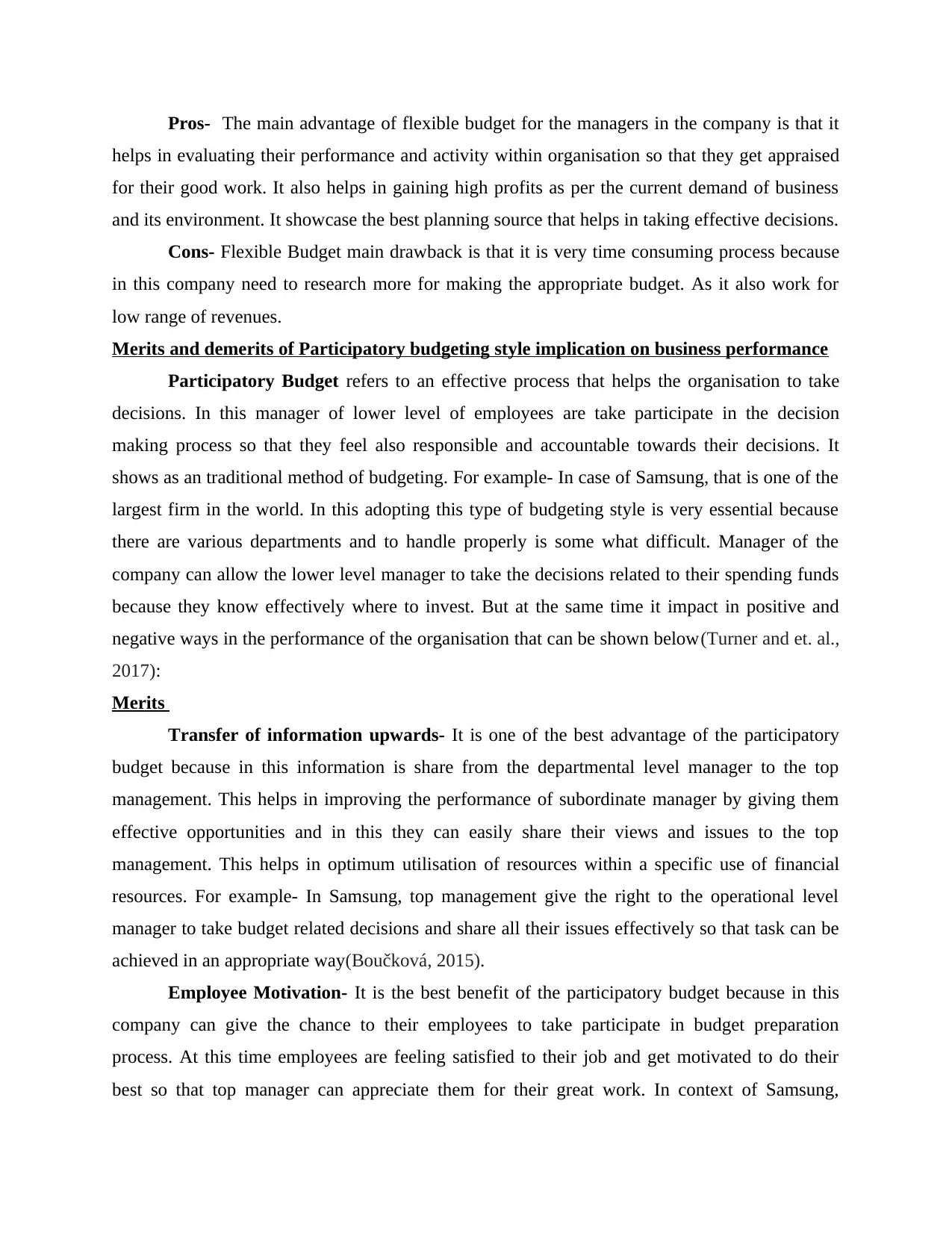
Pros- The main advantage of flexible budget for the managers in the company is that it
helps in evaluating their performance and activity within organisation so that they get appraised
for their good work. It also helps in gaining high profits as per the current demand of business
and its environment. It showcase the best planning source that helps in taking effective decisions.
Cons- Flexible Budget main drawback is that it is very time consuming process because
in this company need to research more for making the appropriate budget. As it also work for
low range of revenues.
Merits and demerits of Participatory budgeting style implication on business performance
Participatory Budget refers to an effective process that helps the organisation to take
decisions. In this manager of lower level of employees are take participate in the decision
making process so that they feel also responsible and accountable towards their decisions. It
shows as an traditional method of budgeting. For example- In case of Samsung, that is one of the
largest firm in the world. In this adopting this type of budgeting style is very essential because
there are various departments and to handle properly is some what difficult. Manager of the
company can allow the lower level manager to take the decisions related to their spending funds
because they know effectively where to invest. But at the same time it impact in positive and
negative ways in the performance of the organisation that can be shown below(Turner and et. al.,
2017):
Merits
Transfer of information upwards- It is one of the best advantage of the participatory
budget because in this information is share from the departmental level manager to the top
management. This helps in improving the performance of subordinate manager by giving them
effective opportunities and in this they can easily share their views and issues to the top
management. This helps in optimum utilisation of resources within a specific use of financial
resources. For example- In Samsung, top management give the right to the operational level
manager to take budget related decisions and share all their issues effectively so that task can be
achieved in an appropriate way(Boučková, 2015).
Employee Motivation- It is the best benefit of the participatory budget because in this
company can give the chance to their employees to take participate in budget preparation
process. At this time employees are feeling satisfied to their job and get motivated to do their
best so that top manager can appreciate them for their great work. In context of Samsung,
helps in evaluating their performance and activity within organisation so that they get appraised
for their good work. It also helps in gaining high profits as per the current demand of business
and its environment. It showcase the best planning source that helps in taking effective decisions.
Cons- Flexible Budget main drawback is that it is very time consuming process because
in this company need to research more for making the appropriate budget. As it also work for
low range of revenues.
Merits and demerits of Participatory budgeting style implication on business performance
Participatory Budget refers to an effective process that helps the organisation to take
decisions. In this manager of lower level of employees are take participate in the decision
making process so that they feel also responsible and accountable towards their decisions. It
shows as an traditional method of budgeting. For example- In case of Samsung, that is one of the
largest firm in the world. In this adopting this type of budgeting style is very essential because
there are various departments and to handle properly is some what difficult. Manager of the
company can allow the lower level manager to take the decisions related to their spending funds
because they know effectively where to invest. But at the same time it impact in positive and
negative ways in the performance of the organisation that can be shown below(Turner and et. al.,
2017):
Merits
Transfer of information upwards- It is one of the best advantage of the participatory
budget because in this information is share from the departmental level manager to the top
management. This helps in improving the performance of subordinate manager by giving them
effective opportunities and in this they can easily share their views and issues to the top
management. This helps in optimum utilisation of resources within a specific use of financial
resources. For example- In Samsung, top management give the right to the operational level
manager to take budget related decisions and share all their issues effectively so that task can be
achieved in an appropriate way(Boučková, 2015).
Employee Motivation- It is the best benefit of the participatory budget because in this
company can give the chance to their employees to take participate in budget preparation
process. At this time employees are feeling satisfied to their job and get motivated to do their
best so that top manager can appreciate them for their great work. In context of Samsung,
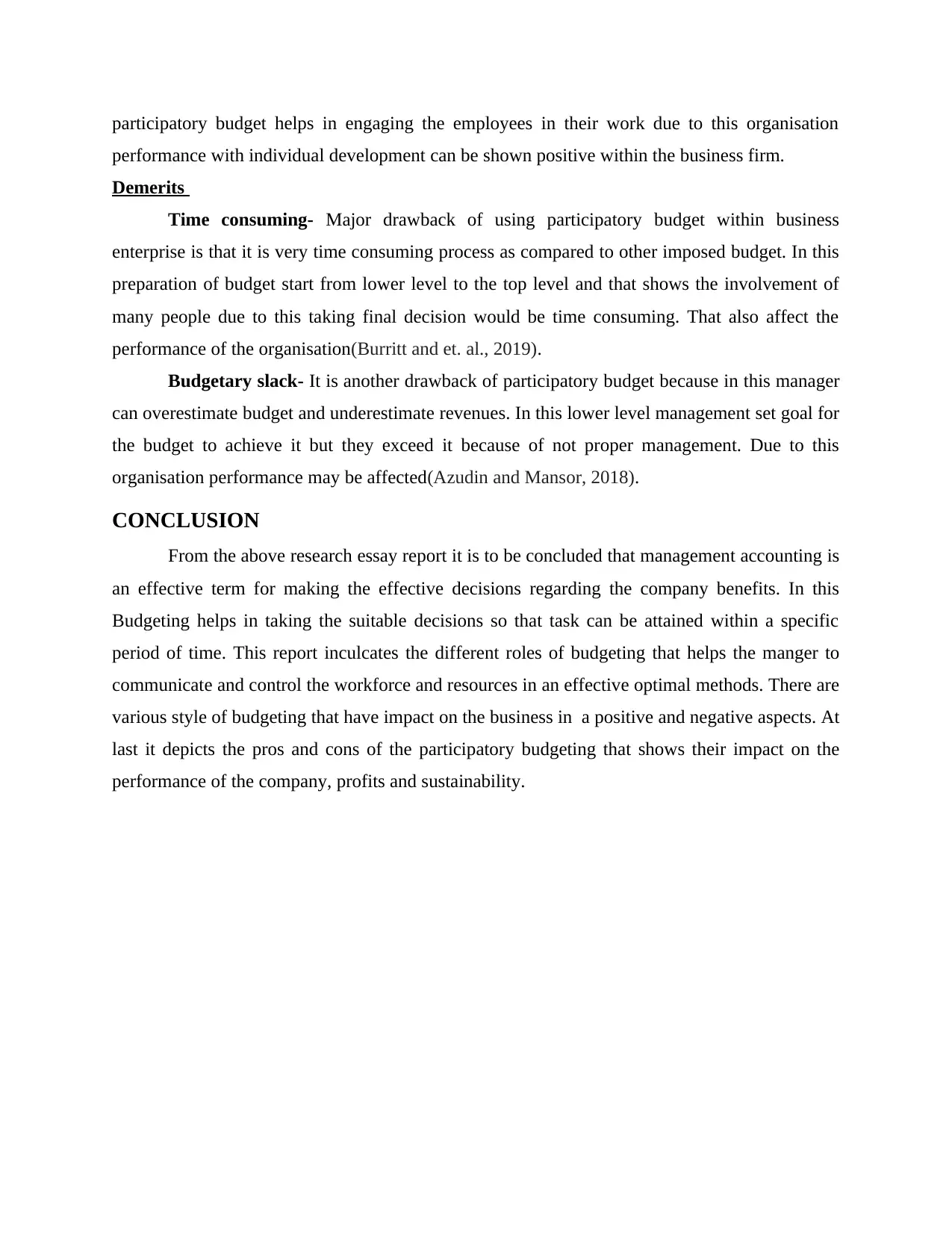
participatory budget helps in engaging the employees in their work due to this organisation
performance with individual development can be shown positive within the business firm.
Demerits
Time consuming- Major drawback of using participatory budget within business
enterprise is that it is very time consuming process as compared to other imposed budget. In this
preparation of budget start from lower level to the top level and that shows the involvement of
many people due to this taking final decision would be time consuming. That also affect the
performance of the organisation(Burritt and et. al., 2019).
Budgetary slack- It is another drawback of participatory budget because in this manager
can overestimate budget and underestimate revenues. In this lower level management set goal for
the budget to achieve it but they exceed it because of not proper management. Due to this
organisation performance may be affected(Azudin and Mansor, 2018).
CONCLUSION
From the above research essay report it is to be concluded that management accounting is
an effective term for making the effective decisions regarding the company benefits. In this
Budgeting helps in taking the suitable decisions so that task can be attained within a specific
period of time. This report inculcates the different roles of budgeting that helps the manger to
communicate and control the workforce and resources in an effective optimal methods. There are
various style of budgeting that have impact on the business in a positive and negative aspects. At
last it depicts the pros and cons of the participatory budgeting that shows their impact on the
performance of the company, profits and sustainability.
performance with individual development can be shown positive within the business firm.
Demerits
Time consuming- Major drawback of using participatory budget within business
enterprise is that it is very time consuming process as compared to other imposed budget. In this
preparation of budget start from lower level to the top level and that shows the involvement of
many people due to this taking final decision would be time consuming. That also affect the
performance of the organisation(Burritt and et. al., 2019).
Budgetary slack- It is another drawback of participatory budget because in this manager
can overestimate budget and underestimate revenues. In this lower level management set goal for
the budget to achieve it but they exceed it because of not proper management. Due to this
organisation performance may be affected(Azudin and Mansor, 2018).
CONCLUSION
From the above research essay report it is to be concluded that management accounting is
an effective term for making the effective decisions regarding the company benefits. In this
Budgeting helps in taking the suitable decisions so that task can be attained within a specific
period of time. This report inculcates the different roles of budgeting that helps the manger to
communicate and control the workforce and resources in an effective optimal methods. There are
various style of budgeting that have impact on the business in a positive and negative aspects. At
last it depicts the pros and cons of the participatory budgeting that shows their impact on the
performance of the company, profits and sustainability.
⊘ This is a preview!⊘
Do you want full access?
Subscribe today to unlock all pages.

Trusted by 1+ million students worldwide
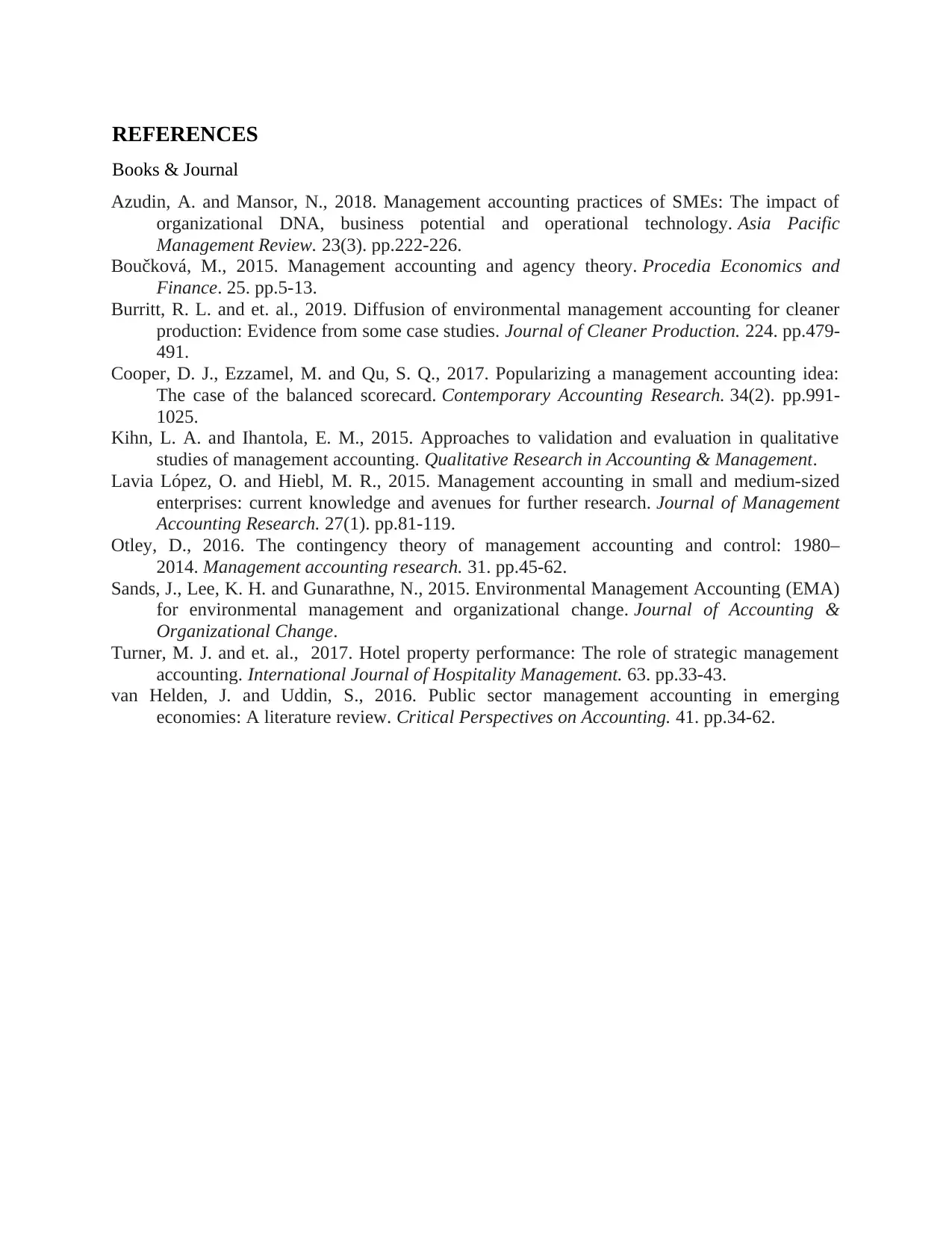
REFERENCES
Books & Journal
Azudin, A. and Mansor, N., 2018. Management accounting practices of SMEs: The impact of
organizational DNA, business potential and operational technology. Asia Pacific
Management Review. 23(3). pp.222-226.
Boučková, M., 2015. Management accounting and agency theory. Procedia Economics and
Finance. 25. pp.5-13.
Burritt, R. L. and et. al., 2019. Diffusion of environmental management accounting for cleaner
production: Evidence from some case studies. Journal of Cleaner Production. 224. pp.479-
491.
Cooper, D. J., Ezzamel, M. and Qu, S. Q., 2017. Popularizing a management accounting idea:
The case of the balanced scorecard. Contemporary Accounting Research. 34(2). pp.991-
1025.
Kihn, L. A. and Ihantola, E. M., 2015. Approaches to validation and evaluation in qualitative
studies of management accounting. Qualitative Research in Accounting & Management.
Lavia López, O. and Hiebl, M. R., 2015. Management accounting in small and medium-sized
enterprises: current knowledge and avenues for further research. Journal of Management
Accounting Research. 27(1). pp.81-119.
Otley, D., 2016. The contingency theory of management accounting and control: 1980–
2014. Management accounting research. 31. pp.45-62.
Sands, J., Lee, K. H. and Gunarathne, N., 2015. Environmental Management Accounting (EMA)
for environmental management and organizational change. Journal of Accounting &
Organizational Change.
Turner, M. J. and et. al., 2017. Hotel property performance: The role of strategic management
accounting. International Journal of Hospitality Management. 63. pp.33-43.
van Helden, J. and Uddin, S., 2016. Public sector management accounting in emerging
economies: A literature review. Critical Perspectives on Accounting. 41. pp.34-62.
Books & Journal
Azudin, A. and Mansor, N., 2018. Management accounting practices of SMEs: The impact of
organizational DNA, business potential and operational technology. Asia Pacific
Management Review. 23(3). pp.222-226.
Boučková, M., 2015. Management accounting and agency theory. Procedia Economics and
Finance. 25. pp.5-13.
Burritt, R. L. and et. al., 2019. Diffusion of environmental management accounting for cleaner
production: Evidence from some case studies. Journal of Cleaner Production. 224. pp.479-
491.
Cooper, D. J., Ezzamel, M. and Qu, S. Q., 2017. Popularizing a management accounting idea:
The case of the balanced scorecard. Contemporary Accounting Research. 34(2). pp.991-
1025.
Kihn, L. A. and Ihantola, E. M., 2015. Approaches to validation and evaluation in qualitative
studies of management accounting. Qualitative Research in Accounting & Management.
Lavia López, O. and Hiebl, M. R., 2015. Management accounting in small and medium-sized
enterprises: current knowledge and avenues for further research. Journal of Management
Accounting Research. 27(1). pp.81-119.
Otley, D., 2016. The contingency theory of management accounting and control: 1980–
2014. Management accounting research. 31. pp.45-62.
Sands, J., Lee, K. H. and Gunarathne, N., 2015. Environmental Management Accounting (EMA)
for environmental management and organizational change. Journal of Accounting &
Organizational Change.
Turner, M. J. and et. al., 2017. Hotel property performance: The role of strategic management
accounting. International Journal of Hospitality Management. 63. pp.33-43.
van Helden, J. and Uddin, S., 2016. Public sector management accounting in emerging
economies: A literature review. Critical Perspectives on Accounting. 41. pp.34-62.
1 out of 7
Related Documents
Your All-in-One AI-Powered Toolkit for Academic Success.
+13062052269
info@desklib.com
Available 24*7 on WhatsApp / Email
![[object Object]](/_next/static/media/star-bottom.7253800d.svg)
Unlock your academic potential
Copyright © 2020–2025 A2Z Services. All Rights Reserved. Developed and managed by ZUCOL.




